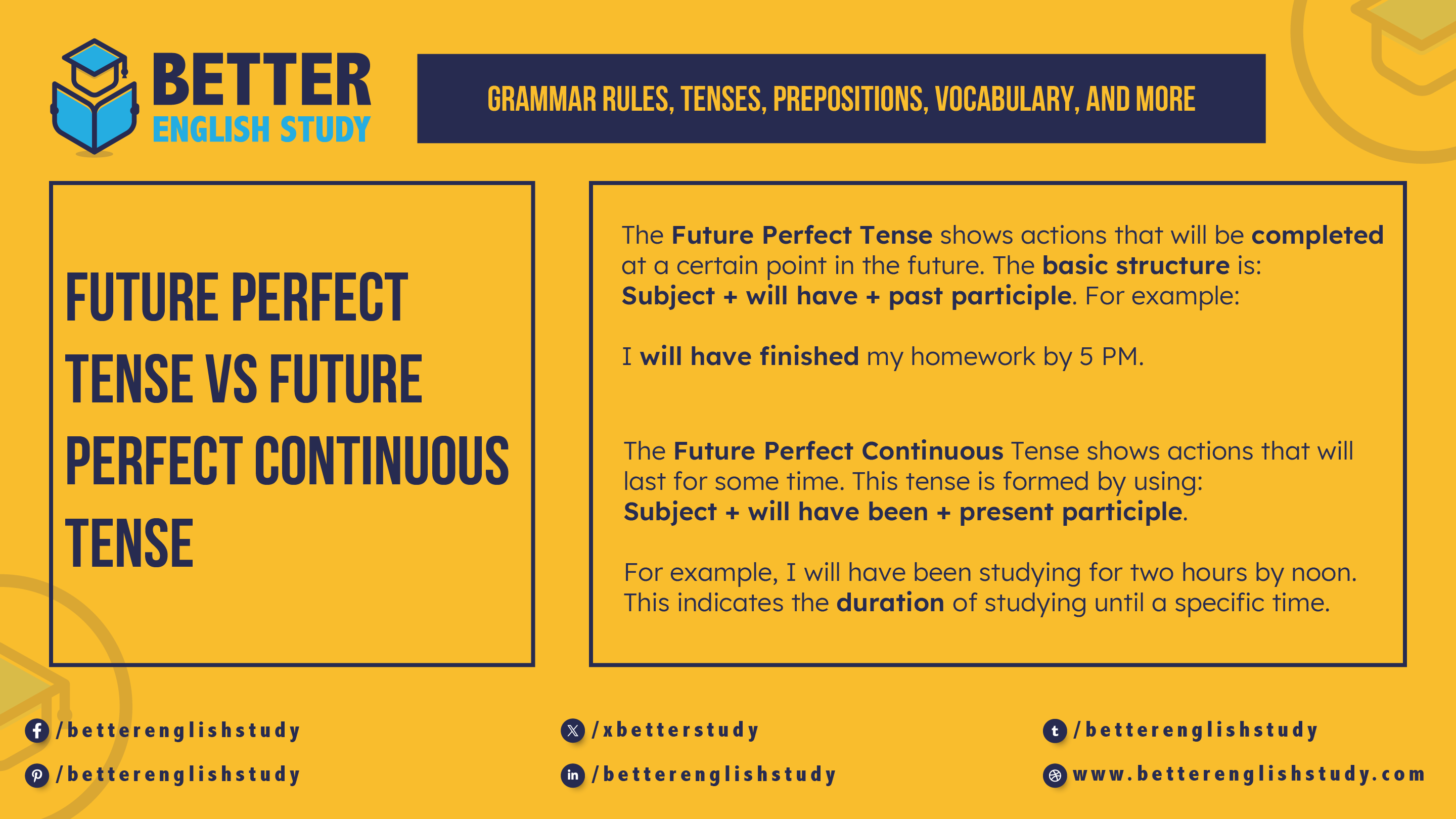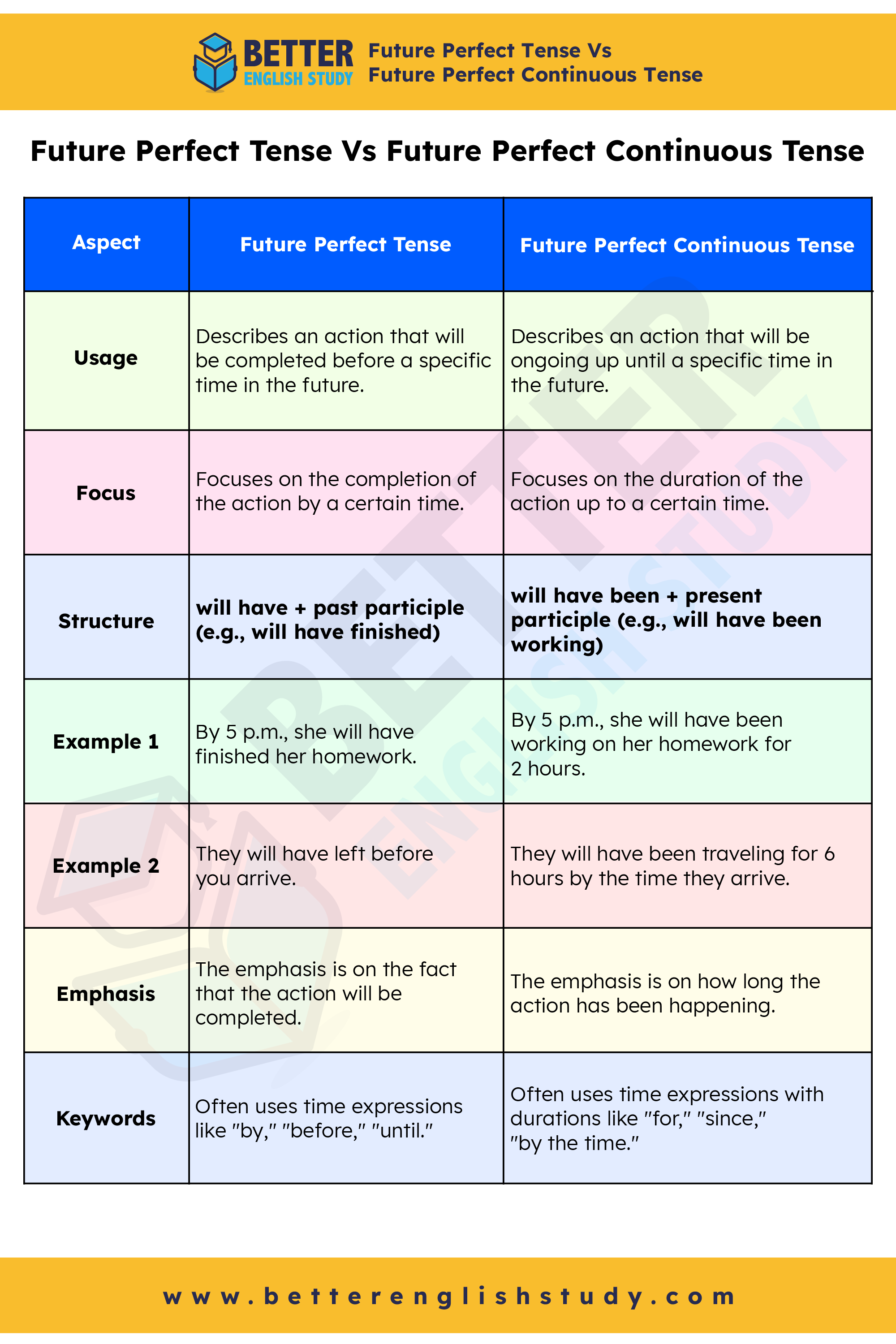
The Future Perfect Tense indicates an action that will be completed by a specific time in the future, such as “I will have finished my work.” The Future Perfect Continuous Tense emphasizes the duration of an action that will continue until a specified time in the future, like “I will have been studying for three hours by noon.”
Understanding verb tenses enhances your writing clarity. The Future Perfect Tense focuses on completed actions, while the Future Perfect Continuous Tense emphasizes ongoing actions. These tenses help convey timelines effectively. Mastering their use can improve both spoken and written communication.
Clear examples illustrate their differences, making it easier for learners to grasp their distinct functions. This knowledge enriches your language skills and boosts confidence.
Introduction To Future Tenses
The future perfect tense expresses actions that will be completed by a certain time. For example, “I will have finished my homework by 5 PM.” This shows the action is complete before a future moment.
The future perfect continuous tense focuses on actions that will continue up to a specific time. An example is, “I will have been studying for three hours by 6 PM.” This highlights the duration of the action.
Understanding these tenses is vital for effective communication. They help convey specific time frames and actions clearly. Using them correctly can make sentences more precise and engaging.
Basic Structure Of Future Perfect Tense
The Future Perfect Tense shows actions that will be completed at a certain point in the future. The basic structure is: Subject + will have + past participle. For example:
- I will have finished my homework by 5 PM.
- She will have completed her project by next week.
- They will have arrived by the time we start dinner.
This tense is useful for expressing completed actions before a specific future time. It emphasizes the completion of the task. This helps to create a clear timeline for events.
Exploring Future Perfect Continuous Tense
The Future Perfect Continuous Tense shows actions that will last for some time. This tense is formed by using: Subject + will have been + present participle.
For example, “I will have been studying for two hours by noon.” This indicates the duration of studying until a specific time.
Another example is, “She will have been working here for five years.” This shows that she has been working continuously.
This tense helps express how long an action will continue in the future. It emphasizes the ongoing nature of actions over time.

Differences between Future Perfect and Future Perfect continuous tense
| Aspect | Future Perfect Tense | Future Perfect Continuous Tense |
|---|---|---|
| Usage | Describes an action that will be completed before a specific time in the future. | Describes an action that will be ongoing up until a specific time in the future. |
| Focus | Focuses on the completion of the action by a certain time. | Focuses on the duration of the action up to a certain time. |
| Structure | will have + past participle (e.g., will have finished) | will have been + present participle (e.g., will have been working) |
| Example 1 | By 5 p.m., she will have finished her homework. | By 5 p.m., she will have been working on her homework for 2 hours. |
| Example 2 | They will have left before you arrive. | They will have been traveling for 6 hours by the time they arrive. |
| Emphasis | The emphasis is on the fact that the action will be completed. | The emphasis is on how long the action has been happening. |
| Keywords | Often uses time expressions like “by,” “before,” “until.” | Often uses time expressions with durations like “for,” “since,” “by the time.” |
In summary, use the Future Perfect Tense for completed actions. Use the Future Perfect Continuous Tense to stress how long something will continue.
Examples To Clarify The Tenses
The Future Perfect Tense shows actions that will be completed by a certain time. For example, “I will have finished my homework by 6 PM.” This indicates that the homework is done before 6 PM.
The Future Perfect Continuous Tense emphasizes the duration of an action. An example is, “I will have been studying for three hours by 5 PM.” This highlights the ongoing nature of studying before 5 PM.
| Tense | Example |
|---|---|
| Future Perfect | I will have traveled to Paris by next year. |
| Future Perfect Continuous | I will have been working here for five years by December. |
Common Errors And Misconceptions
Many learners confuse Future Perfect Tense and Future Perfect Continuous Tense. A common mistake is using the wrong form of the verb. For example, saying “I will have been studying” instead of “I will have studied” can cause confusion.
Another mistake is mixing up the time frames. The Future Perfect Tense focuses on completed actions. The Future Perfect Continuous Tense emphasizes ongoing actions. Understanding this difference is key.
To avoid confusion, practice with clear examples. Try creating sentences that show both tenses. This will help solidify your understanding.
| Future Perfect Tense | Future Perfect Continuous Tense |
|---|---|
| I will have finished my homework. | I will have been studying for three hours. |
| She will have traveled to Paris. | She will have been traveling for a month. |
Frequently Asked Questions
What Is Future Perfect Tense?
The Future Perfect Tense describes actions that will be completed before a specific future time. It often uses “will have” plus the past participle of the verb. For example, “I will have finished my homework by 6 PM. ” This tense emphasizes completion in the future.
What Is Future Perfect Continuous Tense?
The Future Perfect Continuous Tense focuses on actions that will continue up to a certain point in the future. It uses “will have been” plus the present participle. For instance, “I will have been studying for three hours by 5 PM.” It highlights the duration of an ongoing activity.
How Do These Tenses Differ?
The main difference is that Future Perfect Tense emphasizes completion, while Future Perfect Continuous Tense emphasizes duration. The former looks at the end result, while the latter focuses on the ongoing nature of an action until a future point. Understanding this helps in accurate usage.
Can You Give Examples Of Each Tense?
Sure! For Future Perfect Tense, an example is: “She will have traveled to Paris by next month. ” For Future Perfect Continuous Tense, an example is: “They will have been working here for five years by July. ” These examples illustrate their unique focuses on completion and duration.
Conclusion
Understanding the difference between Future Perfect and Future Perfect Continuous tenses enhances your writing skills. Both tenses express future actions, but they focus on different aspects. By mastering their usage, you can convey precise meanings in your sentences. Practice with examples to solidify your grasp of these essential grammatical concepts.
